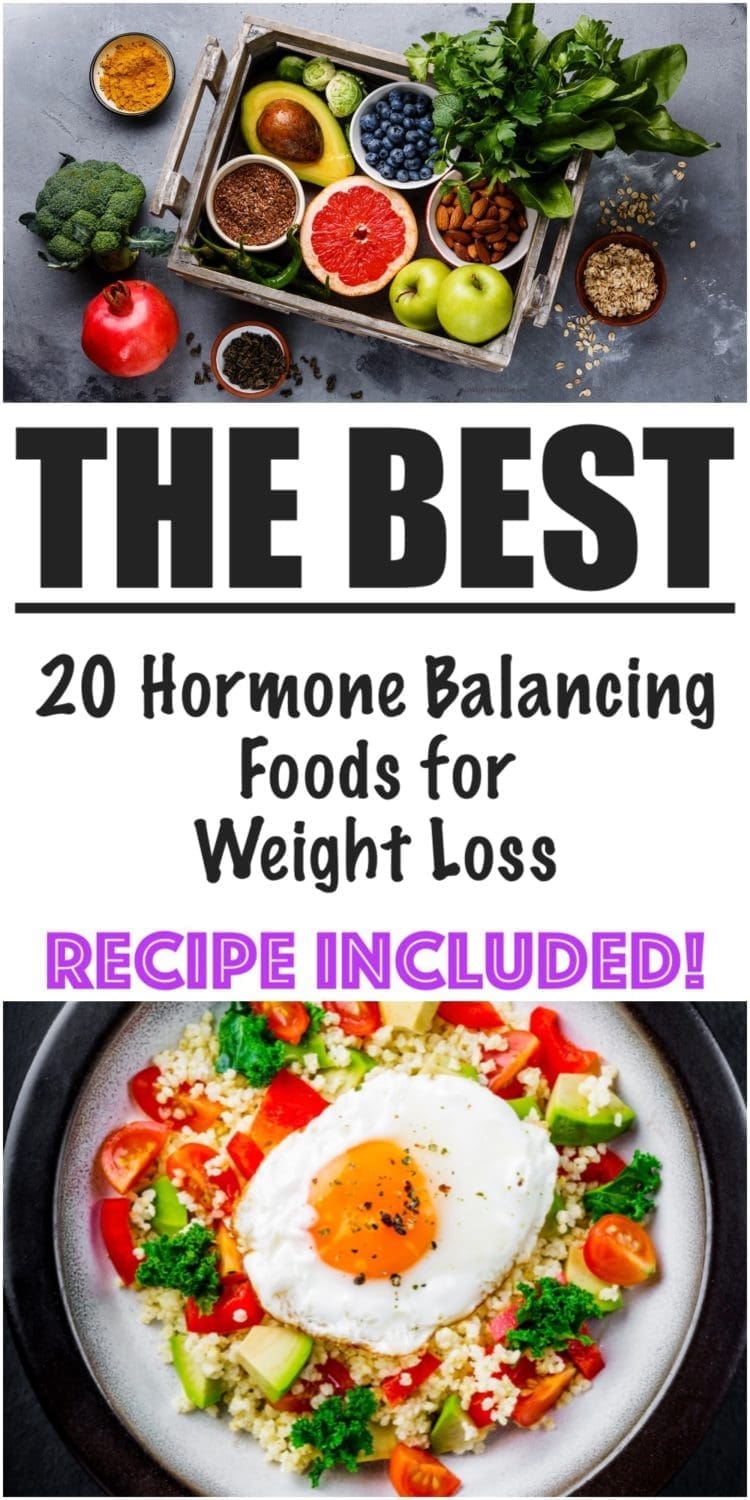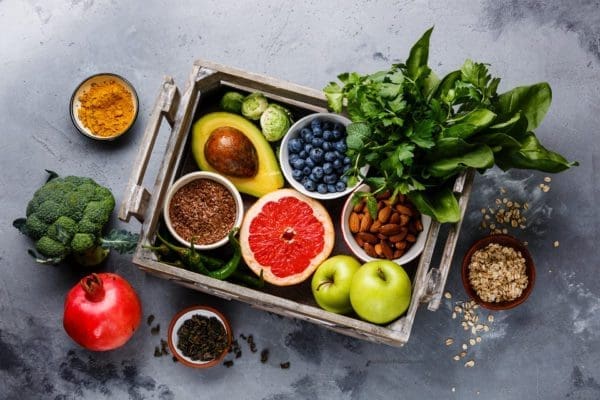Find the 20 Best Hormone Balancing Foods, plus a hormone balancing recipe to get your started.
With these 20 healthy ingredients you’ll find that weight loss is easier. Mood is happier and more balanced, and skin is clearer and more vibrant.
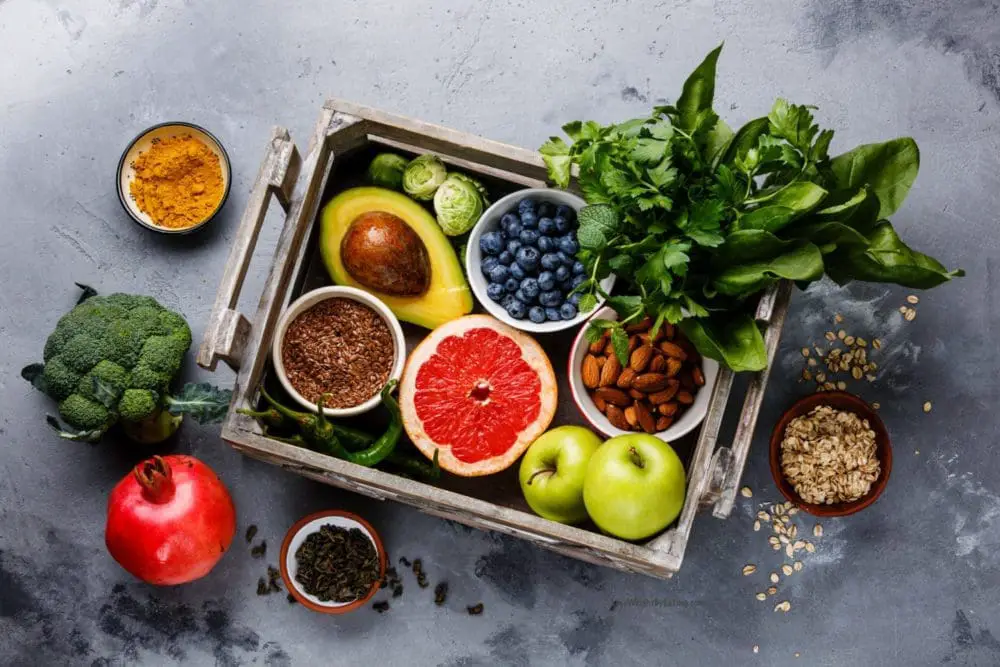

We love each and every one of these hormone balancing ingredients. But just incase you don’t eat meats, we’ve been sure to include many vegan, vegetarian and even gluten free hormone healthy foods to enjoy.
The easiest way to include these hormone healthy foods, is to work them into your snacks, or one meal per day.
It’s always easier to add in ingredients, than to remove them. So concentrate on adding these ingredients at least once a day.
The Importance of Balancing Hormones
Hormones are chemical messengers that control various processes in the body.
They regulate everything from growth and development to mood, metabolism, sexual function, and reproductive health.
When a hormone imbalance occurs, it can trigger negative effects on your physical and mental health, some more noticeable than others.
It’s important to have a hormone balancing diet to help restore balance, improve health, and live life to the fullest.
The following article lists the top 20 best foods for balancing hormones naturally without medication…
The 20 Best Hormone Balancing Foods
Not sure where to start? Below you’ll find a vegetarian recipe with 6 different hormone healthy ingredients in it!
So read through for the 20 Best Hormone Balancing Foods, or skip ahead to the hormone balancing recipe…
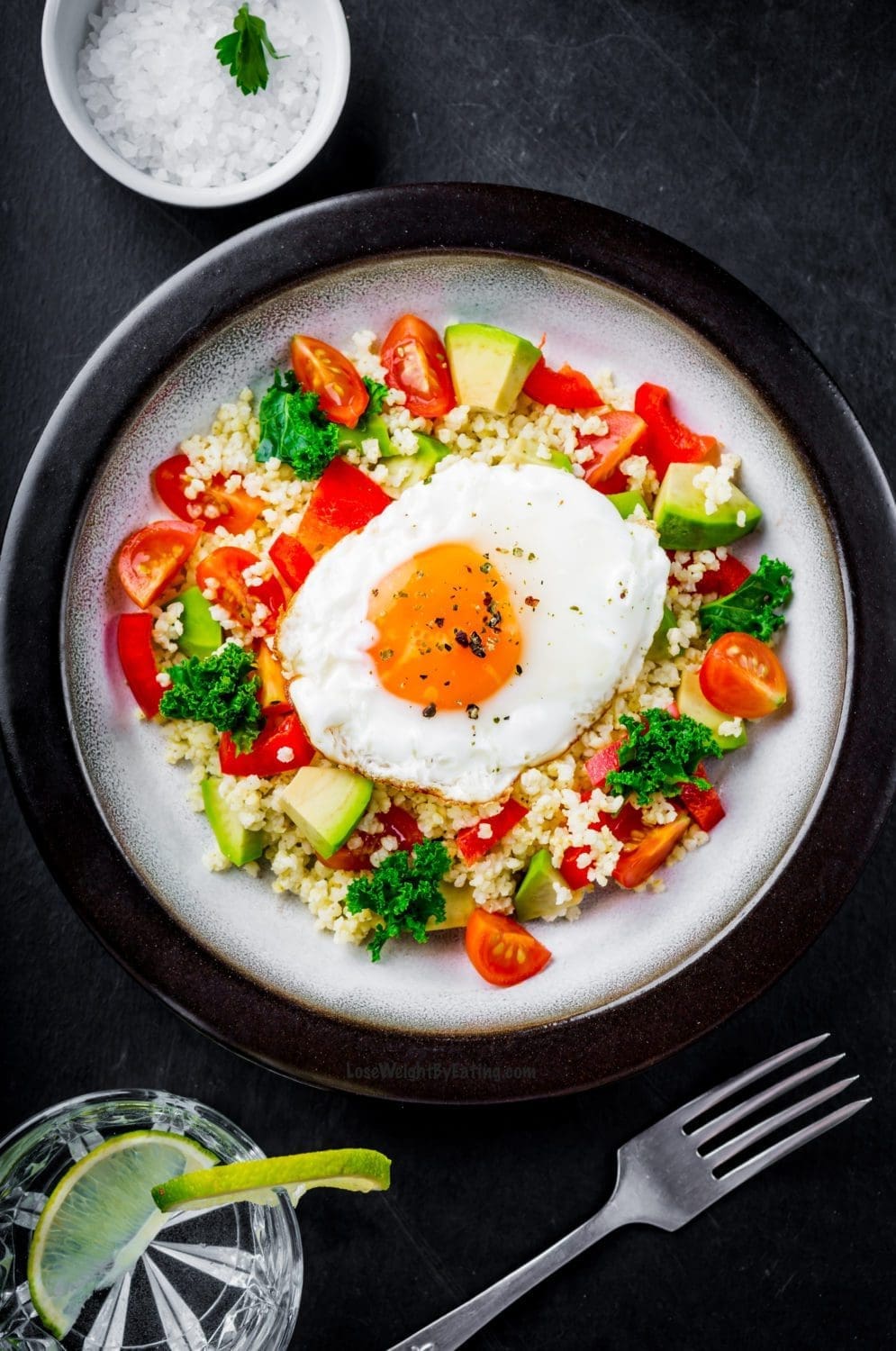

1. Oyster:
Oysters are loaded with zinc and selenium, two nutrients that play an important role in hormone balance.
They also contain high levels of Omega-3 fatty acids, which are beneficial for overall health and help to reduce inflammation. (1)
2. Cruciferous Vegetables:
Cruciferous vegetables such as broccoli, Brussels sprouts, cabbage, and kale are rich in indole-3- carbinol.
Indole-3- carbinol is a a compound that helps to detoxify estrogen and reduce its harmful effects.
These veggies are also high in fiber, vitamin C, and antioxidants, all of which are beneficial for hormone health. (2)
3. Flax seeds:
Flax seeds are a great source of lignans, a type of phytonutrient that helps to balance hormones.
Lignans are converted in the colon into enterolactone. A compound that can bind to estrogen receptor sites and prevent excess estrogen from binding.
These seeds are also high in fiber, omega-3 fatty acids, and antioxidants. (3)
4. Sunflower Seeds:
Sunflower seeds are loaded with vitamin E, a fat-soluble vitamin that plays an essential role in hormonal balance.
Vitamin E also has antioxidant properties, which fight oxidative stress by neutralizing free radicals. (4)
5. Almonds:
Almonds are a great source of healthy monounsaturated fats, vitamin E, and magnesium.
These nutrients are all beneficial for hormone health and help keep hormone levels in balance.
Magnesium is especially important, as it is needed for the conversion of thyroid hormones from T4 to T3. (5)
6. Walnuts:
Walnuts are a good source of omega-3 fatty acids, magnesium, and vitamin E.
Like almonds, these nutrients are all beneficial for hormone health and help to keep hormone levels in balance.
Walnuts also contain high levels of antioxidants, which fight oxidative stress that can damage hormone receptors. (6)
7. Green Tea:
Green tea is a great source of antioxidants, including catechins and EGCG, which help to protect hormone receptors from oxidative stress.
It also contains high levels of amino acids like theanine and L-theanine, which promote relaxation and support serotonin levels.
Tea is also high in catechin polyphenol EGCG, which boosts metabolism and supports weight loss goals. (7)
8. Lean Beef:
Lean beef is a good source of protein, zinc, and iron.
These nutrients are essential for hormone health and help keep hormone levels in balance.
Lean beef is also high in creatine, a compound that supports muscle growth and lean body weight. (8)
9. Chicken:
Chicken is a good source of protein, zinc, and selenium.
Like beef, these nutrients are essential for hormone health and help to keep hormone levels in balance.
Chicken is also a good source of B vitamins, which are necessary for the conversion of thyroid hormones from T4 to T3. (9)
10. Eggs:
Eggs are a good source of protein, B vitamins, and selenium.
Like chicken and beef, these nutrients are all beneficial for hormone health and help to keep hormone levels in balance.
Eggs are also high in omega-3 fatty acids, which support overall health and help to reduce inflammation. (10)
11. Quinoa:
Quinoa is a seed that has been eaten since ancient times and is called “the mother grain” by the Incas.
This gluten-free grain is a smart choice for a hormone-balancing diet. It’s a complete protein that contains iron, magnesium, and fiber. (11)
12. Millet:
Millet is a gluten-free grain that is high in fiber, magnesium, and B vitamins.
All of these nutrients are important for hormone balance.
Millet is also a good source of protein, making it a great choice for those who follow a plant-based diet. (12)
13. Grapefruit and Citrus Fruits:
Grapefruit and citrus fruits are a good source of lycopene.
Lycopene is a a carotenoid with antioxidant and anti-inflammatory properties.
It can reduce the risk of hormone-related cancers. It is also high in fiber and vitamin C. (13)
14. Coffee:
Drinking coffee may reduce the risk of endometrial cancer, one of the most common cancers associated with hormone imbalance.
Coffee is high in antioxidants and contains compounds that can help to improve insulin sensitivity. (14)
15. Fish:
Fish is a great source of protein that also contains beneficial fatty acids like Omega-3s.
These fatty acids are important for hormone health and help to reduce inflammation.
Fish is also a good source of vitamin D, which is important for regulating testosterone levels in men and women. (15)
16. Organ Meats:
Organ meats such as liver, heart, and kidney are some of the most nutrient-den\se foods on the planet.
They are high in essential vitamins and minerals, including B vitamins, iron, and copper.
These meats are also rich in cholesterol. Which is the precursor for all of your steroid hormones, including cortisol, estrogen, progesterone, and testosterone. (16)
17. Unsweetened Cocoa:
Cocoa powder is loaded with beneficial antioxidants that can help to improve heart, brain, and hormone health.
Unsweetened cocoa contains high levels of magnesium, which is important for maintaining hormone balance.
It’s also a good source of zinc, another mineral that is essential for healthy hormones. (17)
18. Asparagus:
This delicious vegetable is high in protein, fiber, and B vitamins.
It also contains antioxidants that can help to lower inflammation.
Asparagus is also a good source of vitamin E, which can help regulate estrogen levels in the body and protect against hormone imbalance. (18)
19. Avocado:
Avocados are a nutritional powerhouse and are especially high in healthy fatty acids.
They are also rich in fiber, potassium, vitamin E, and folic acid.
These are all nutrients that are important for hormone health. Especially folic acid which can help to reduce the effects of excess estrogen. (19)
20. Tofu:
Tofu is a plant-based source of protein that is also high in calcium and magnesium.
These minerals are important for maintaining hormone balance.
Tofu is also a good source of isoflavones. A type of phytoestrogen that can help to reduce the risk of hormone-related cancers. (20)
Hormone Balancing Recipe
The foods listed above are all excellent choices for a hormone balancing diet.
Incorporating these foods into your daily routine can help to keep your hormones in balance and improve your overall health.
Try this healthy millet salad. With millet, eggs, avocado, walnut oil, fresh citrus juice, and kale (a cruciferous veggie), this vegetarian salad is packed with 6 hormones balancing ingredients!
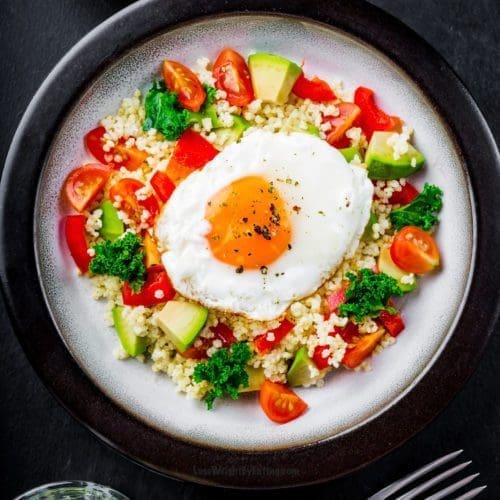

Hormone Balancing Meal (JUST 395 CALORIES)
Ingredients
- ⅛ cup millet
- ¼ cup water
- Olive oil spray
- 1 egg
- 1 cups chopped kale
- 10 cherry tomatoes quartered
- ½ avocado sliced
Hormone Balancing Dressing:
- Juice of 1/2 an orange
- ½ tablespoon walnut oil or olive oil
- ½ teaspoon dijon mustard
- 1 teaspoon balsamic vinegar
Instructions
- To a small pan, combine the millet and the water.
- Bring to a simmer on medium heat, cover, then lower the heat to the lowest setting.
- Meanwhile, add all the dressing ingredients to a jar, cover and shake. Or add to a bowl and whisk.
- Heat a skillet over medium heat and lightly spray with olive oil.
- Crack the egg into the hot skillet and cook undisturbed for 3 minutes, or until you’ve reached your desired doneness.
- To a bowl, add the millet, kale, tomatoes, and avocado.
- Drizzle the dressing over the ingredients, then top with the egg and serve.
Notes


Nutrition
What to Read Next:
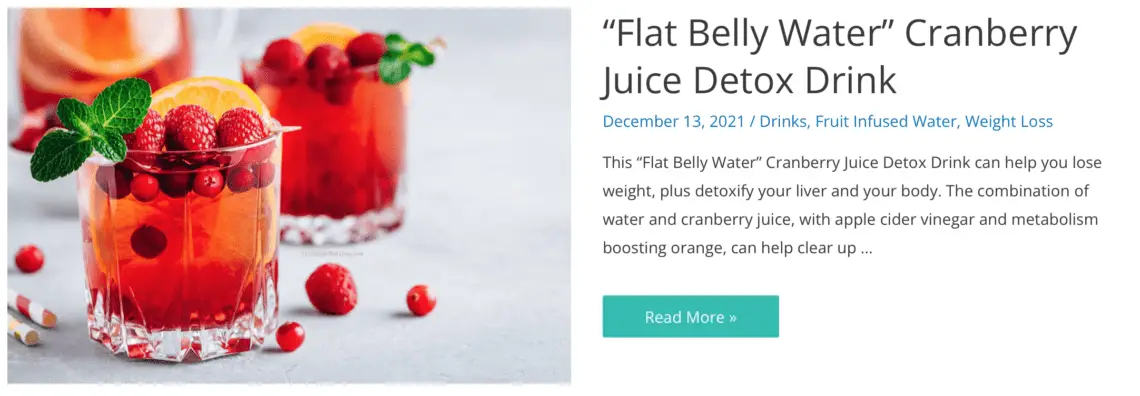

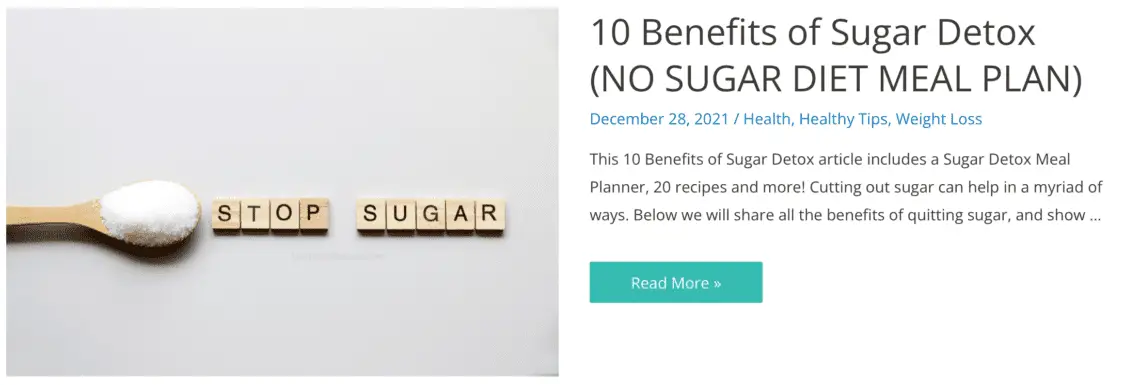

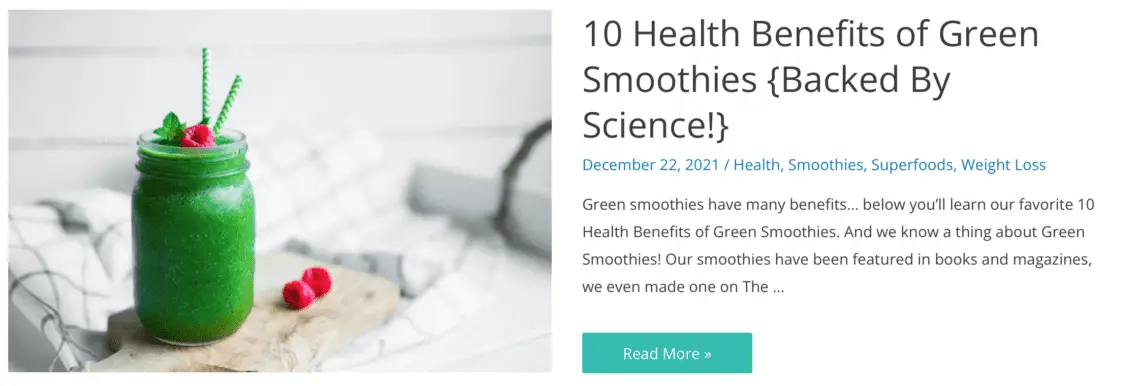

Lose Weight By Eating Cookbooks
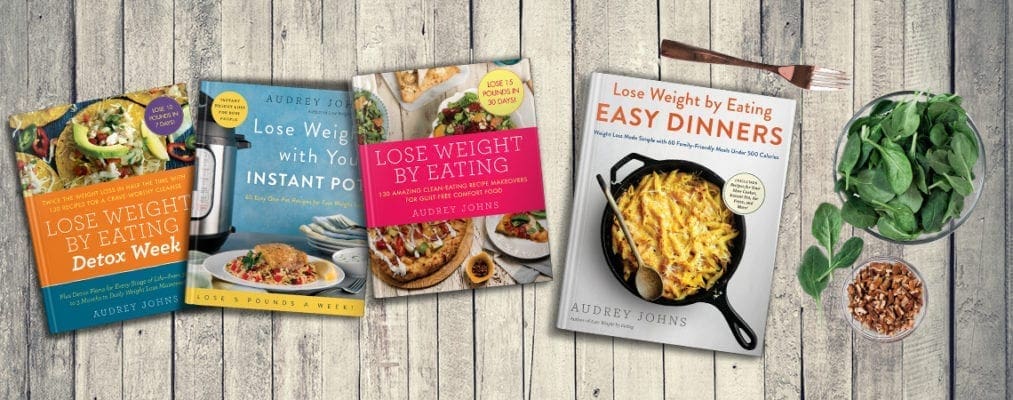

Pin this Article to Pintrest:
